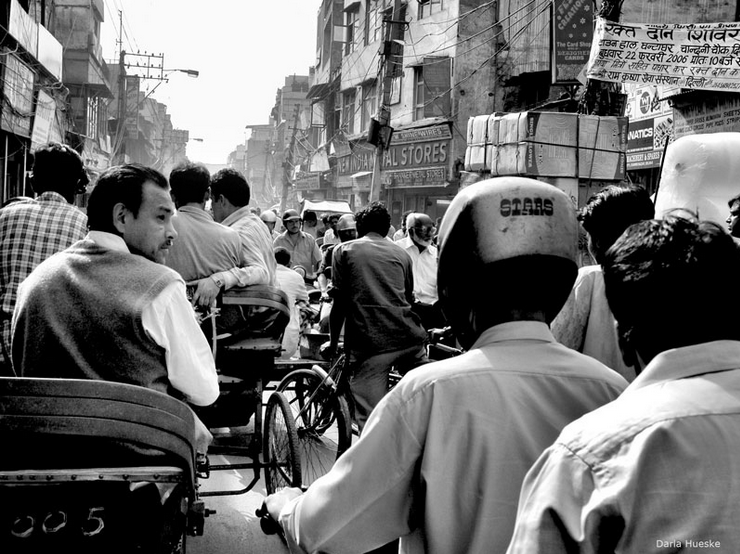
By Sunish Jauhari and Meera Vijayann
Ever driven in India?
If so, then you know how tricky—not to mention dangerous—it can get. Potholes, poor road design and a lack of pavements are a major threat to motorists and pedestrians across India. Yet, this chaotic environment is today the breeding ground for vibrant social innovation.
Solomon Prakash, the co-Founder of mGaadi, an m-commerce solution that allows citizens to download a simple app on their smartphone and book an auto rickshaw, is among the most vocal about this.
“When people complain about auto drivers, the government’s usual response is to penalize. We want to change that through mGaadi. Our aim is to incentivize, not penalize,” he says.
In a city that has over 1,50,000 auto drivers, a technological solution like this is welcome relief. The initiative has successfully signed up more than 2,100 auto rickshaw drivers providing these drivers with access to a GPS navigating system, which allows them to keep track of their journeys and the meter. Flailing an auto standing on the road, bargaining for a good price and the hassle of paying extra to travel a short distance is now no more.
Interestingly, the app is one of many that is catching on with youth. Be it the well known luxury service, Uber cars, or Smart Skull, a helmet that provides accident alerts, the country is brimming with optimism in combating these issues. In an environment of policy-paralysis, where demand on the existing road infrastructure is at an all-time high, untried and unique approaches by social innovators are also bringing fresh perspectives to the table.
Global corporations such as UL, a safety certification company, are as excited about this development. “Social innovations and ideas are often the most practical, locally relevant and self-sustaining responses to the needs of a market or a society,” says R. Venkitachalam, vice president and managing director at UL, which is now working towards supporting local innovations that show promise.
For many, personal loss and struggle has been a steady motivation to work towards better solutions.
Piyush Tewari, the founder of road safety advocacy group, Save Life Foundation, talks about the sense of helplessness and loss he felt when his 17-year old cousin lay on the road after an accident, and who lost his life because no one attended to him for nearly 45 minutes. Fervently passionate about changing this, Piyush has been the sole force behind the Save Life Foundation, which has successfully pushed for change at the policy level. It has also successfully trained more than 6,000 bystanders and 4,500 traffic officers in emergency response in order to reduce road accident fatalities. In an effort to encourage more citizen participation, the Save Life Foundation is also pushing for the “Good Samaritan Law” to be adopted in Parliament. The law would protect bystanders who act to rescue an accident victim.
Working with civic bodies, on the other hand, can often prove complicated when attempting to drive policy forward. “The challenge is that the outcome we want for road safety does not belong to one department with whom you can centralize your whole effort,” elaborates V. Ravichandar, the founder of the Bangalore City Connect Foundation (BCCF).
One solution appears to be in creating models that allow different civic bodies to participate in implementing new ideas. BCCF and other initiatives, like Tender SURE (Specifications for Urban Roads Execution), a public-private network focused on the role of urban planning in improving road infrastructure, seek to bring in outside stakeholders to collaborate with the government.
Another organization focused on engaging the government is working at the local level. Concern for Road and Pedestrian Safety (CoRPS) is a social enterprise in Bangalore that is focused on the role of ward corporators, who are the elected representatives in India responsible for public amenities including roads in a ward.
Over the years, a ward corporator’s role has evolved so that a high level of public service delivery is not expected of them. In response, CoRPs has launched a ward development initiative that encourages ward corporators to re-establish a connection with the citizens of their ward.
The success of projects like BCCF, Tender SURE and CoRPS indicate that approaches that engage citizens and different sectors of the economy can inspire change within a fragmented policy network.
The challenge of introducing new policy has been debated intensely in mainstream Indian media. In contrast, social innovations have often generated a spark in the system influencing policy and creating widespread impact.
This piece was co-written by Sunish Jauhari and Meera Vijayann from Ashoka India, a leading international association of social entrepreneurs.





























Comments